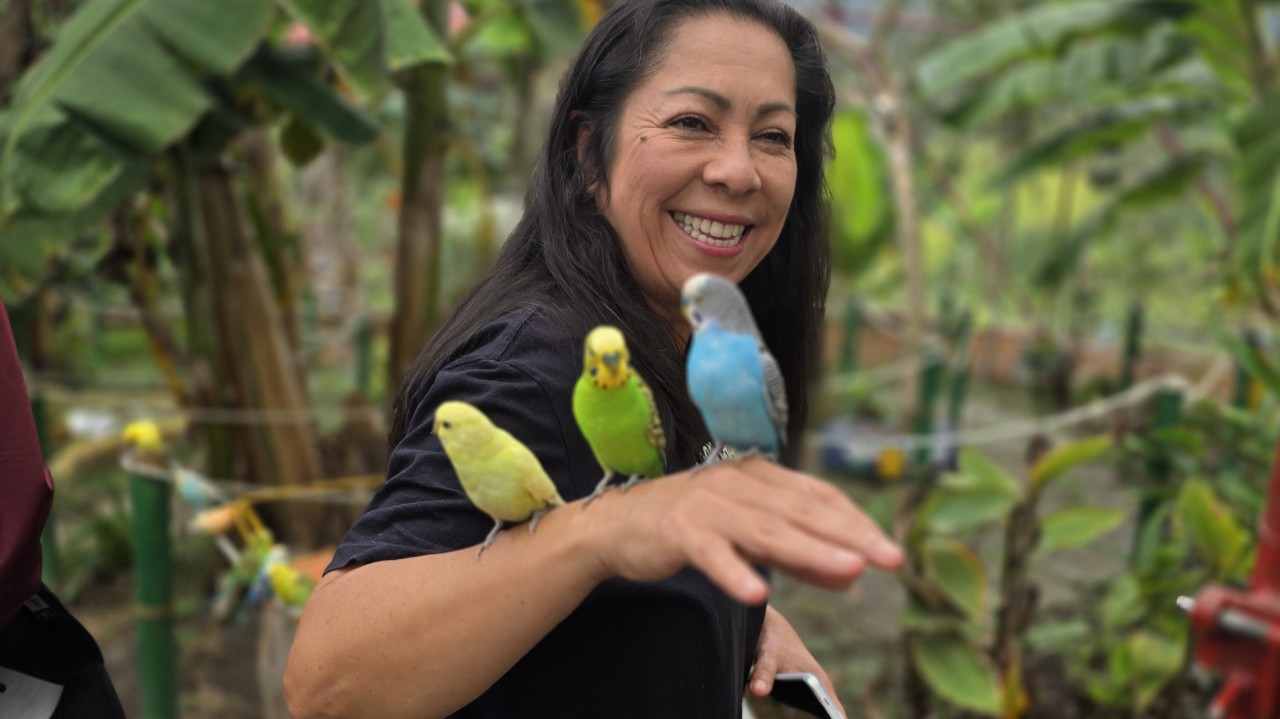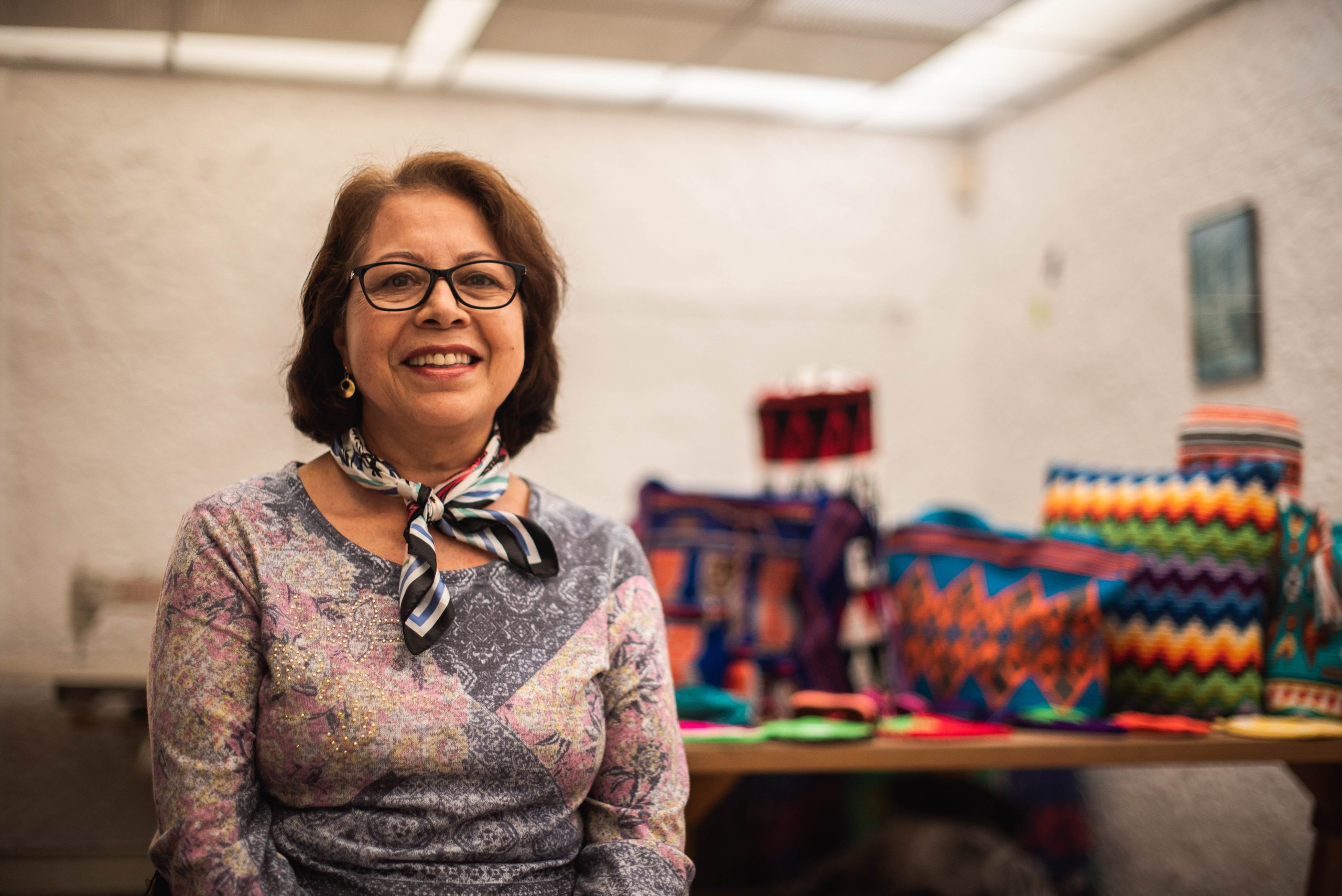Written by: María José Escobar, Gender and Livelihoods Coordinator at Fundación Capital
Women Entrepreneurs Shaping Their Own Paths to Autonomy
Economic independence is crucial for women to make autonomous decisions, escape cycles of poverty and violence, and gain agency over their lives. However, women face higher rates of poverty than men due to entrenched gender norms that lead to an unequal division of labor. Many women, who were already affected by poverty and unemployment, have been pushed into self-employment without the necessary resources, capital, or technological skills to succeed.
Limited access to technology prevents women from fully realizing the potential of their businesses. Without digital tools, they struggle to reach new markets, streamline processes, connect with clients, improve their financial health, or access crucial information and learning opportunities. Many women entrepreneurs face social judgment and a lack of support from various sources—family, society, and institutions—leading to feelings of isolation and overwhelm. Funding constraints, driven by limited financial education or mismatched financial products, hinder their ability to grow and sustain their businesses.
Additionally, digital exclusion makes it harder for women to save time. A significant concern for many women is "time poverty," resulting from the unequal distribution of unpaid caregiving work, which often falls disproportionately under their responsibility. This forces many women—especially caregivers for young children, older people, or individuals with disabilities—into entrepreneurship because it offers the flexibility.
To address these needs, the Conectadas program, supported by the Internet Society Foundation, was created to strengthen the entrepreneurial capacity, income, resilience, and self-efficacy of women entrepreneurs through the use of the internet. With a gender-focused approach that promotes equity, the program provides digital skills and tools to enhance their businesses, while empowering them to overcome social barriers. Women are no longer disconnected from the digital world—today, they are active internet users, leveraging it to grow their ventures, pursue personal development, and build strong support networks.
After two successful iterations, we have learned:
The Internet is a powerful catalyst for economic inclusion, particularly for women, people with disabilities, and those with caregiving responsibilities.
The Internet allows entrepreneurs to reach a larger audience and sell their products effectively. Through the Internet, entrepreneurs can promote their brand via social media and increase their networks with potential customers, other entrepreneurs, and providers; engaging with prospects, taking advantage of digital tools to improve messaging, targeting, content creation, and advertising; speeding up sales processes, leveraging business tools and social media to automatize communication, improve delivery time, reduce transactional costs, and facilitating financial inclusion through digital payment methods; retaining customers through customer service, market analysis, feedback, and product improvement and innovation by benchmarking and accessing online courses to improve techniques and processes.
«As an entrepreneur: The internet has allowed me to connect with more clients and suppliers, which has increased my sales and enabled me to expand my business globally.
As an artisan: Social media has allowed me to showcase my work and connect with people who appreciate my art, increasing my visibility and enabling me to sell my products to people who otherwise wouldn't have known about my work.
As a mother: The internet has allowed me to access resources and information that have helped me become a better mother, from parenting advice to homeschooling resources.
As a person: The internet has allowed me to connect with people who share my interests and passions, which has enriched my life and enabled me to learn and grow continuously.»— Program participant.
The flexibility of the Internet allows entrepreneurs to carry out these activities without the constraints of time or location. In contexts where caregiving alternatives among families, communities, the State, or the market are not available or accessible, digital tools provide women with alternatives for economic inclusion, giving them greater autonomy to define if and how they balance professional and domestic responsibilities on their terms. Moreover, digitalization is especially advantageous for individuals with disabilities or caregiving duties, as it offers flexible and accessible work options that traditional employment may not provide. Programs focusing on digital inclusion should prioritize these individuals, as digital tools can open new pathways to economic empowerment and self-sufficiency.
«The truth is that I find the digital aspect of the internet very interesting and timely because, for example, and I speak from my own experience, as a caregiving mother with a child with a disability, I find it great to have the opportunity to work digitally from home. It gives me the chance to care for my child with a disability and look after my home» Program participant
Confidence is the foundation for digital inclusion
Achieving meaningful digital inclusion for women entrepreneurs requires addressing the perception of the Internet as a daunting, distant space. The online world often feels foreign, even intimidating, due to self-doubt in navigating digital tools and fears of online security threats. Many participants initially undervalued their worth, not only as individuals but also as business owners, doubting their business potential and lacking encouragement from their social circles. Effective digital inclusion programs must, therefore, include a comprehensive methodology that prioritizes self-efficacy, helping women view the Internet as a pathway to their goals rather than a barrier, and training in online security for participants to understand how to protect themselves online, they're better equipped to take those first steps.
«I learned how to use social media, take attractive photos, and create videos that showcase the quality of my products. This program not only provided me with digital tools but also restored my confidence in my abilities. Now, I feel empowered and capable of achieving whatever I set my mind to.» – Program Participant.
Curriculum Flexibility and Practical Approach is key.
To effectively support diverse learning needs, the curriculum must be comprehensive and adaptable. Simplifying digital concepts and avoiding technical jargon can make digital tools more approachable and methodologies should be short, focused, and complemented by accessible physical and digital resources for participants to revisit information at their own pace. Furthermore, to promote sustained engagement in long-term training, a blend of in-person and virtual methods is crucial so that participants remain motivated.
Peer-to-Peer Support for Enduring Success
Having a trained, empathetic team that is sensitive to each participant's unique circumstances was indispensable. Team members, particularly those with entrepreneurial experience, were able to build trust and rapport, listening to challenges and encouraging participants to achieve the goals they aim to achieve with the project.
For this matter, ongoing communication through calls, messages, and social media groups on platforms like WhatsApp and Facebook is vital for maintaining participants' interest and ensuring continued engagement. This approach is followed by providing participants with safe spaces to share their struggles and inviting and dynamic to be a relief and motivator rather than an obligation and additional load.
Using a relatable character also contributes to it. In Conectadas, we introduced a fictional entrepreneur named Rosy. Throughout the program's materials and communication channels, Rosy shares how she utilizes the Internet to enhance her business, expand online, and achieve a better work-life balance. The name "Rosy" also pays tribute to the "Top Secret Rosies"—the women mathematicians who played a crucial role in developing ENIAC, the first programmable computer, in 1945.
«It’s important to understand that the women entrepreneurs we have the opportunity to work with often lack access to technology—and even more so to guided learning on these topics. In this context, they were learning through trial and error or with the help of family members. The arrival of projects like Conectadas in their communities—even directly into their homes and businesses—allows them to gain more practical and effective knowledge of technology and social media for the benefit of their businesses. This opens greater possibilities for financial inclusion, such as online sales, digital payments, and access to training and learning spaces, all within a framework of safety and trust in using these services. Taking on these opportunities is a necessary challenge in today’s world, especially for those starting businesses and looking to overcome exclusion from the financial system.» —Esneda Egas, program facilitator
Addressing gender norms broadens the impact and leaves no one behind
Gender-based violence (GBV), stereotypes, and caregiving responsibilities were significant obstacles for many participants, being significant barriers to staying on track in the project due to limited self-confidence, a lack of support, and violence impacting both their physical and mental well-being, and limited time, energy, and focus for their businesses, making it challenging to maintain a continuous and balanced progression in the program.
Tools like IgualdApp, an educational app developed by Fundación Capital to challenge gender norms, helped participants extend gender equality learning to their families and communities, creating a broader support network.
Additionally, a dedicated gender component allowed participants to prioritize self-care, increase self-efficacy, recognize and address GBV situations. Providing safe, inclusive spaces for in-person training, with flexibility for those with caregiving duties, was essential for building a supportive learning environment.
«Before participating in Conectadas, I had never experienced anything like it. It was a life-changing experience—not only because of what I learned, but because of how it made me feel. From the very first day, I realized this wasn’t just another course; it was an opportunity to grow, to feel empowered, and to believe in myself. The way this project was carried out was incredible. They listened to me, answered my questions, and most importantly, made me feel I wasn’t alone. At every step, I felt supported, accompanied, and valued.» — Program Participant
Digital Inclusion for Financial Health
Financial education and effective business management were key to ensuring the long-term success of the participants. Technology served as a crucial ally in simplifying financial education and reducing fears around formal banking. Thanks to tools like LISTA+, an educational app developed by Fundación Capital for financial education, participants learned to plan savings, budget effectively, and explore digital financial products such as mobile wallets, which enabled them to adopt better savings practices and even access credit options.
Where Next?
After two successful iterations, our curriculum has proven effective in leveraging the Internet to promote women’s economic inclusion and agency. Building on this success, we aim to expand our reach to more women in Colombia and Latin America. To do so, we will harness emerging Internet-based opportunities, including Artificial Intelligence (AI) while preserving the strengths of close, human-centered support.
Our next step involves evolving into a high tech but high touch methodology, testing, refining, and iterating a flexible, AI-powered coaching program, maintaining the empathetic, hands-on guidance provided by our facilitators, to provide personalized support to gain confidence and lose fear to taking next steps in the Internet and technologies, enhances digital engagement, and addresses women’s unique needs.
By considering the realities of the care economy, we will deliver cost-effective, tailored solutions that adapt to individual needs and preferences, ensuring they remain relevant, sustainable, and scalable.
Unresolved Questions: Shaping the Future of Economic Inclusion
In Colombia, entrepreneurship often takes place within the informal economy, limiting access to social security systems. This reality poses significant challenges, especially for women, who face additional barriers as they age. Many lack pension benefits and must continue seeking income-generating opportunities.
Additionally, women are frequently tasked with caregiving responsibilities for grandchildren or other family members, further complicating their economic security. These dual burdens reveal a critical need for systemic change.
How can social security systems be adapted to better support women navigating the intersections of informal entrepreneurship, caregiving, and aging?
This question calls for innovative solutions and collaborative efforts from organizations like Fundación Capital and public institutions. Addressing this issue requires a deep understanding of the informal economy’s dynamics and the obstacles preventing women from accessing formal support networks.
To learn more about our initiatives, follow us, reach out, and share.


